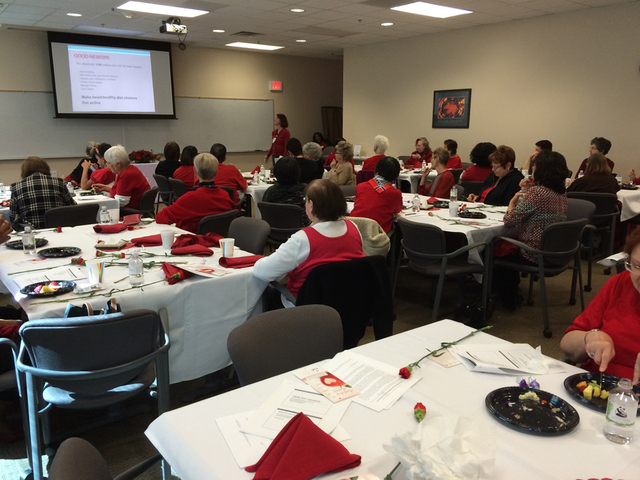Heart attacks in women present themselves differently than in men
The room was full of red sweaters, coats and outfits as Women Enlightened presented We Wear Red! Feb. 27 at Summerlin Hospital Medical Center, 657 N. Town Center Drive. This day, it focused on how heart attacks in women differ from their male counterparts.
One of the attendees was Phyllis David of The Lakes, who said she was there because she goes “to a lot of lectures … but especially on health because without health, you don’t live.”
Myra Lee Glassman was there and said she follows a healthy diet, exercises and takes a statin drug to keep her cholesterol in check but that she has “a slanted view because I’m a retired physician, so I’ve been doing all the right things.”
Registered nurse Heather Brookman, outpatient cardiac rehabilitation nurse for the hospital, began the We Wear Red! event with sobering statistics from the American Heart Association. In the U.S., 375,000 people die of a heart attack each year. Also, 85 million Americans are living with some form of cardiovascular disease or the after-effects of stroke.
“When we talk about cardiovascular disease, I mean hearts and brains,” Brookman told the 50 attendees. “The two places where we always want to make sure our vessels are open are our hearts and brains. So, cardiovascular diseases are the No. 1 cause of death in the United States and the world for both men and women.”
Brookman told how, in the past, it was thought heart disease was “not a big deal for women, but heart disease causes one in three women’s deaths each year. Breast cancer causes one in 31. Heart disease causes more death than all forms of cancer combined.”
Risk factors included tobacco use, diabetes, high blood pressure, physical inactivity, overweight, poor diet, stress, genetics and age. Diabetes increases the risk for heart disease two to four times.
Since 1984, more women than men have died from heart disease.
“So, it’s not just a man’s disease, is it?” Brookman asked. “If you still smoke, please stop. Your lung function does get better, almost as soon as you stop. It will never be back to where it was.”
Brookman went over cholesterol numbers, saying total cholesterol should be less than 200.
“If you’re a diabetic, it should be less than 160,” Glassman added.
Exercising is a big part of prevention, and one is never too young to begin, attendees were told. The World Health Report, published by the World Health Organization, says that at least 30 minutes of exercise a day can reduce one’s risk of heart disease by 30 to 40 percent. Brookman said to find something that’s fun to help one stick with the exercise. Getting your heart rate up by 30 beats per minute helps the heart, but don’t sabatoge it with diet.
“If you’re exercising every day, and you’re not a smoker and doing your best to not be stressed out, is it OK to eat Twinkies every day?” Brookman asked. “No. That’s a very important part.”
As much as 85 percent of damage occurs within the first two hours of a heart attack, according to Chest Pain Centers. Women have what’s been deemed the Silent Heart Attack. Symptoms can include nausea, pain down both arms, jaw pain, fatigue, anxiety, chest pressure, back pain, shortness of breath and a feeling of fullness.
“You can have any of these, just one of these or any combination,” Brookman said. “Some of them are quite vague. But you can’t wait for that elephant sitting on your chest feeling before you start being suspicious.”
One woman spoke up, joking, “I’ve got a lot of those symptoms all the time.”
If one suspects a heart attack, call 911, do not drive yourself and have someone take you to the emergency room. The EMTs can handle a patient’s immediate needs and transmit vitals to the hospital so a team can be ready to take over care.
The event included a short video of a young career mother having heart attack symptoms but ignoring them to continue caring for her family until she could not ignore them any longer. Attendees also were treated to a heart-healthy lunch and received a free paperback copy of a cookbook with heart-healthy recipes.
Contact Summerlin Area View reporter Jan Hogan at jhogan@viewnews.com or 702-387-2949.

















